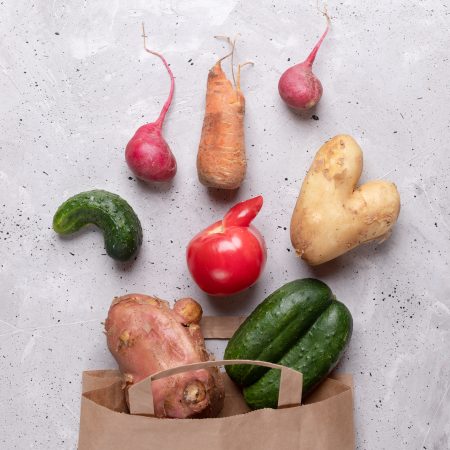
Sustainable Change: Love your imperfections
By Cher Mereweather
Sustainability Fruit & Vegetables Cher Mereweather food waste marketing Provision Coalition Ugly vegetables Photo © SeNata / Adobe Stock
Photo © SeNata / Adobe Stock Today, I want to talk about fruits and vegetables, but not the shiny, perfectly graded and meticulously displayed apples, oranges and greens adorning the shelves of produce sections from coast to coast.
Instead I want to talk about ugly vegetables—contorted carrots, blemished broccoli angular asparagus and knobby potatoes.
Those of you who regularly read this column know how passionate I am about food waste, or rather, about preventing and repurposing it.
Twenty-two per cent of food waste happens at the farm. Nearly $2.88 billion of nutrient-rich produce is ploughed under or sent to compost or animal feed every year.
The reasons for this waste are complex, but in my experience, they are often connected to the fact that Mother Nature doesn’t always produce perfectly formed produce.
Empathy as a driver
In Spring, I was part of a masterclass that looked at how business is changing as a result of the pandemic. It was fascinating. As the course unfolded, I saw example after example of how companies are using empathy, purpose and emotional connection to transcend almost all other drivers of business and build movements based on a common cause and a yearning to connect.
After a year-and-a-half of lockdown, it would appear that we all mostly want to connect and to belong again.
As I was digesting these insights, my mind kept wandering back to food waste. How could we learn from this and build a movement around waste? How could we create empathy around waste? It’s hard to get emotionally connected to waste in a food processing plant (the language of SOPs and HACCP doesn’t really do it for most people), but what about fruit and vegetables at farm level?
The ugly vegetables
Elsewhere in the world, the ugly vegetable movement has had notable successes. Start-ups, such as Misfits Market or Imperfect Foods, are rescuing ugly produce and selling it to customers at a significant discount.
However, it feels like we have been slower on the uptake here in Canada. Perhaps the leader nationally is Loblaws, whose Naturally Imperfect range reaches across both the fresh and frozen produce categories. But even there, the products are marketed under the No Name brand, and positioned for price, not value. There is little emotional connection or empathy to be had about a plain yellow bag of potatoes, even if you do get a few more for your dollar.
What if we could see ugly produce as a real marketing opportunity? One that is very much grounded in a post-COVID world, where purpose, sustainability and empathy are increasingly shaping how we live, and how consumers shop.
B-Yourself
The Ontario potato grower, Brenn-B, has done just that. Shawn, Chris and Nicki Brenn are the fifth generation to farm potatoes near Hamilton, Ont. Each year, their team plants, tends and harvests over 800 acres, producing for many of Canada’s mainstream retailers. Every year they have seconds and smalls that just don’t make the grade for retail or processing.
Until last year, these would go to animal feed. Until, that is, our team at Provision, in partnership with Sherpa Creative helped the Brenns launch B-Yourself, their new brand of perfectly imperfect potatoes sold at Sobeys.
The first thing you spot on the bright orange B-Yourself bags are the ugly potatoes, sassily dressed up with hand-drawn wigs and glasses to look like characters out of a Pixar cartoon. Each character has a little word bubble next to them, proclaiming that they “only have eyes for you”, or asking you to “love your imperfections, just like I love mine”. Turn the bag over and out jumps the copy: “Mother Nature doesn’t always grow supermodel spuds. But that doesn’t make them any less loveable or worthy of your dinner table. So, B-Yourself, and come celebrate the imperfections that make us who we are”.
Celebrating our imperfections, encouraging consumers to be themselves, creating emotional connections in a world which is yearning for them…this is how we should be marketing ugly fruits and vegetables. This is how we should be engaging consumers in creating awareness, and (dare I say it) a movement around food waste based on inspiration and empathy, not on bland bags and a promise of more spud for your buck.
So, I call out to all farmers, producers, restaurateurs and retailers—let your ugly produce become a source of creativity, where the pressure of being perfect can be replaced by the desire to simply connect, over a good meal, with people we really care for.
Cher Mereweather, CEO of Provision Coalition, Inc., is a food industry sustainability expert based in Canada.
This article was originally published in the July/August 2021 issue of Food in Canada.
Print this page